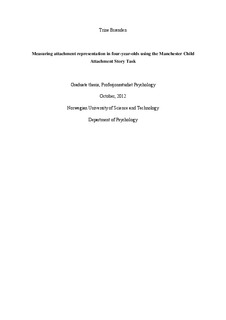Measuring attachment representation in four-year-olds using the Manchester Child Attachment Story Task
Master thesis
Permanent lenke
http://hdl.handle.net/11250/270963Utgivelsesdato
2012Metadata
Vis full innførselSamlinger
- Institutt for psykologi [3086]
Sammendrag
The Manchester Attachment Story Task (MCAST) is an instrument developed to assess preschool and school-aged children’s attachment representations. It has previously not been validated for children below 4.5 years. This study examined the discriminative validity of MCAST against a series of potential factors that may threaten the validity of the measured attachment in four-year-olds. Specifically variations in; children’s; (1) age and (2) cognitive/language ability, administrators (3) experience and (4) style, and coders (5) inter-rater reliability, and these factors in relation to MCAST attachment classifications, disorganization-scores and narrative coherence were investigated. A total of 872 children were assessed using MCAST as a measure of attachment. Peabody Vocabulary Test III-r (PPVT) was used to assess language/ cognitive competence, and Språ 4 to assess language competence. There were no age effects in attachment classifications for the whole interview or for some of the vignettes, in narrative coherence or disorganization scores. PPVT and Språ 4 showed a significant relationship to the variance in attachment categories. PPVT accounted for 2.3 % of the variance in d-scores and 1.3 % of the variance in coherence. It was found significant negative relationship in administrators experience and children’s scores on disorganization. Coder’s factor measured by inter-rater reliability was low. It is discussed whether the results from the study can be reliable considering low inter-rater-reliability. According to findings related to children and administrator factors, the results indicate that MCAST can be used in younger children than it is previously validated for. A more comprehensive validation study and some adjustments in the manual are recommended.
